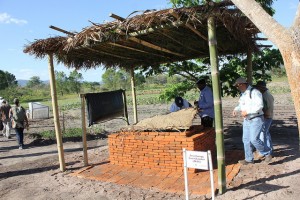By Mohmad Arief Zargar, University of Kashmir, India
This post is part of the ADM Institute’s #PreventPHL blog campaign, following up on the First International Congress on Postharvest Loss Prevention. To read more posts in the series, click here.

The zero-energy cool chamber (ZECC) at the Horticulture Innovation Lab Regional Center at Zamorano, in Honduras, uses evaporative cooling to bring down the temperature of produce fresh from the field. / Credit: Horticulture Innovation Lab, UC-Davis
I think the biggest cause of postharvest losses in developing countries is the lack of knowledge regarding the causes of losses and their prevention. When the poor stakeholders (growers, traders, marketers, retailers) do not know the root cause of problems, how can they address them? In most cases, even the simpler and cheaper solutions can make huge differences, but only when stakeholders know the cause.
One example is temperature management of fresh fruits and vegetables. Temperature is one of the biggest causes of PH losses and the remedy lies in its control. It can be controlled through various simple and easy means to reduce PHL drastically. Just storing in cold locations (which can be as simple as tree/cloth-shade, Zero Energy Cool Chambers, simple hydrocooling by stream waters, harvesting in morning, etc,) after harvest can make a difference. So the first and foremost step should be to sensitize and practically educate the stakeholders about the effects of temperature, and the need and ways to control it through simple and cheap techniques. Then refrigeration during storage, transport and retail and other costly methods can be introduced at a relatively advanced stage and finally the sophisticated Integrated Postharvest Handling & Cold Chain.
Though the technologies do exist in the developed world to address the various causes of PH loss, the stakeholders in the developing world either do not have access to these techniques and technologies or do not have knowledge about them. So the first and foremost step in redressal of PHL would be practical education at the ground level in the form of training and services centers.
I think PHL Congress is a small but first step in this direction. We learned a lot during the congress and made many useful but informal connections. My suggestion is that all the participants of this congress should be linked somehow in an integrated network to work in a coordinated manner. The representatives from the developing world should be given a chance/help/funding to set up Postharvest Training and Services Centers (PHTSC) in their respective states in order to impart practical training to the stakeholders. Besides, I opine that the informal connections made by different participants should be formalized through PHL congress so that their work and outcomes can be made accountable.
The blog entries in this #PreventPHL series are by students and members of the PHL Prevention community of practice. The opinions expressed are those of the individual authors and do not necessarily reflect the position of the ADM Institute. In addition, none of the statements should be considered an endorsement of any person, product, or technique by the ADM Institute.


No comments yet.